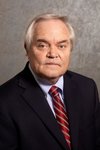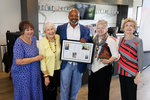

You could learn something Wednesday about what a community can be if you put some time, effort and perseverance into making a city and a county better — and don’t forget some vision.
You just have to put your mind and heart to it.
And understand that neither fire nor flood nor civil unrest or even a health pandemic can deter us from being all we can be and that today can be better than yesterday and tomorrow better than today. It’s something a downtown Presbyterian preacher taught us 200 years ago.
“Starting in a kitchen fire just a few blocks away on the corner of Market Square on an early Sunday morning in May, Fayetteville’s Great Fire of 1831’s central starting point was part of the reason it caused so much destruction and spread so rapidly,” CityView Media publisher Tony Chavonne would remind us Wednesday at the second annual CityView Downtown Visionaries awards luncheon at Segra Stadium. “The fire jumped from wooden roof to wooden roof, and the pine buildings were like tinder fueling the blaze even more.”
The inferno, he said, was contained in four hours.
“But not before taking 600 buildings from our downtown, including hundreds of homes, a school, two hotels, 105 stores, two banks and all but one of the city’s churches,” the former four-term city mayor said. “Where once a thriving city stood, the fire left only stacks of unsteady chimneys and crumbling walls.”
Imagine if we had lived during Fayetteville’s Great Fire of 1831.
Imagine the shock.
Imagine the trauma.
Imagine the angst of downtown residents and merchants.
Then Chavonne told us about the preacher and a determined and resilient community that would dream of better days because they put their hearts and minds to build back better from the charred destruction.
“Pastor Henry Augustus Rowland from the Presbyterian church immediately began to organize the recovery,” Chavonne said. “Over $100,000 was raised to support the community from private contributions that poured in from all over the country. Just 15 months later the church was rebuilt and rededicated and the downtown began its ambitious recovery.
“Pastor Rowland’s early example of resilience and visionary leadership are what we celebrate today in people like Harry Shaw and Menno Pennink who join the ranks of Bill Hurley, C.R. Edwards and Rosalie Kelly and countless others. People from all walks of life that shared a love of our downtown and helped lead us through devastating fires and floods, civil unrest, wars, suburban flight and big box malls.
“Today, we welcome you as we give thanks for their efforts, our downtown visionaries,” Chavonne said. “And we celebrate the blessings of the progress we’re seeing and the future economic opportunities for our downtown, and pray for the same promise and hope that Pastor Rowland expressed in his church rededication remarks when he described the rebuilding of the downtown – ‘A new scene that has now opened before us.’ May we again share that same promise and hope for our downtown.”
‘Give the award to Anthony’
You knew Chavonne’s words were resonating with Menno Pennink, the retired neurosurgeon who became so passionate in the 1990s and 2000s about revitalizing what was an abandoned downtown of boarded-up and vacant buildings. And with the widow and daughters of the late Harry Shaw, who was the vision behind Cross Creek Linear Park that stretches from Festival Park, down by his boyhood home of Hawley Lane and out toward U.S. 301.
Pennink and Shaw were dreamers.
They dared to believe that today could be better than yesterday and tomorrow better than today. They were dreamers just like Bill Hurley, the late mayor who believed Hay Street was better than seedy bars and “ladies of the evening.” Just like the late Rev. C.R. Edwards, the Baptist preacher of Moore Street who would not stand for racial injustice. And just like Rosalie Huske Kelly, who was an encyclopedia when it came to telling the history of Fayetteville.
“If Daddy were here, he would be so proud,” daughter Sally Schmitz said in accepting the honor for her father along with sister Faison Covington.
Covington later would say her father just wanted to see the park completed for the community.
“And he would say, ‘Give the award to Anthony,’” she said about Anthony Ramsey, the Fayetteville-Cumberland Parks & Recreation landscape engineer who worked by Shaw’s side in the park’s 12-year journey.
And the family did.
“Mr. Shaw loved Fayetteville and that trail,” said Ramsey, 62. “I’m going to hang it in my office.”
Harry Shaw died at age 91 on May 19, 2018.
‘Downtown is coming back’
Pennink left his medical career behind and turned his vision into revitalizing downtown in 1992 when he recruited 17 businessmen to join him in purchasing the decaying Prince Charles Hotel. After selling the hotel, he later began buying old properties along the 300 block of Hay Street, first on the south side and finally on the north side. And it is where Pennink joined with developers Ralph Huff, Tommy Bradford and Mark Stout to develop 300 Hay with four penthouses, 18 condominium homes and 20 townhomes along Ray Avenue and Franklin Street.
“I am very humbled to receive this award and to share it with Ralph Huff, Tommy Bradford and others,” Pennink said. “It’s not just me. I think the downtown is coming back, and with a tremendous future.”
Suzanne Pennink recalled her husband’s thoughts after his medical retirement.
“He said, ‘I’ve only got one patient left, and it’s the downtown,’” she said. “‘And it’s on life support.’”
Other dreamers
We learned, too, on Wednesday from artistic director Mary Kate Burke that COVID-19 could not deter the Cape Fear Regional Theatre board of directors from expanding the theater with a $1 million interior renovation and that $5 million from the Cumberland County legislative delegation out of the state budget will help lead to a $16 million state-of-the-art center.
“We last renovated in 1988,” she said. “With more space, we serve more people. It’s important we have a building worthy of what is happening on our stage.”
Burke said the theater served 49,000 theater-goers in 2021.
Brian Haney, the assistant county manager, said the $84 million Crown Event Center is on track, with site selection the latest phase in the project to replace the outdated Crown Theatre and adjacent Crown Arena by October of 2025. Sites under consideration are downtown, the Outer Loop and the current site of the theater and arena on U.S. 301.
Mac Healy offered details about the proposed $80 million N.C. Civil War & Reconstruction History Center for Arsenal Avenue.
“We are not a confederate museum,” said Healy, co-chair of the center’s foundation. “We are covering the story of the reconstruction period more than anything else. Our state delegation brought back $400,000. These people really went to bat for us.”
Once built, the center will have a $20 million economic impact and be operated by the state, according to Healy. Consideration is underway, he said, to name the building the N.C. Civil War, Emancipation & Reconstruction History Center.
Bianca Shoneman, president and CEO of the Cool Spring Downtown District, unveiled a State of the District report with a wealth of information on downtown businesses, residential expansion and cultural and entertainment activities.
“In 2021, we celebrated 23 new black-owned businesses, and plans are in the works for 20 residential units along Adams Street and 202 apartment units atop the Hay Street Parking Garage overlooking the baseball stadium.
“We love this city,” Shoneman said, “and want it to be a place for you to call home.”
Epilogue
No question, Wednesday was a day for learning something about our city, county and downtown, and the men and women past and present leading the way.
“We are committed to not just telling Fayetteville’s stories,” Tony Chavonne would say, “but Fayetteville’s great stories.”
Bill Kirby Jr. can be reached at billkirby49@gmail.com or 910-624-1961.